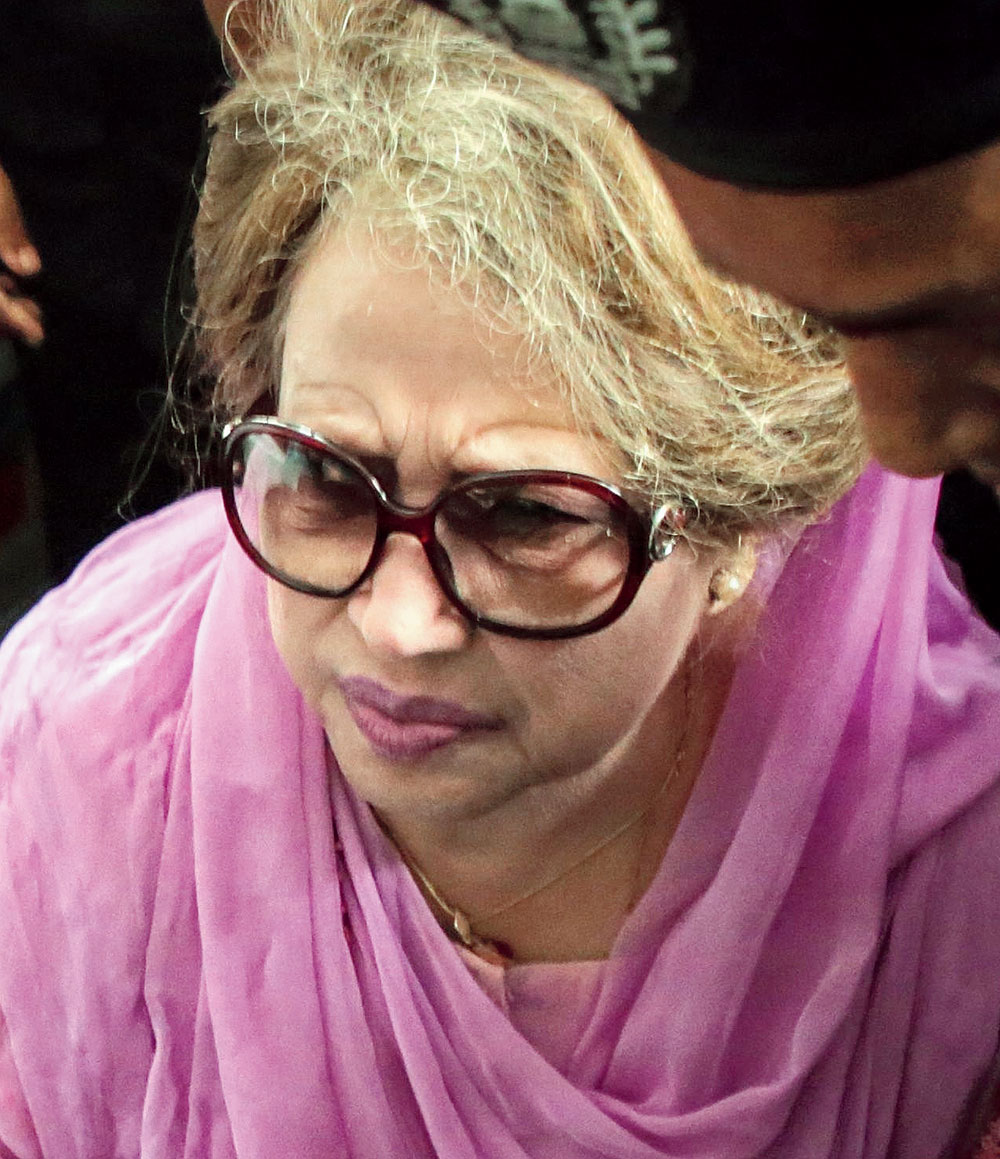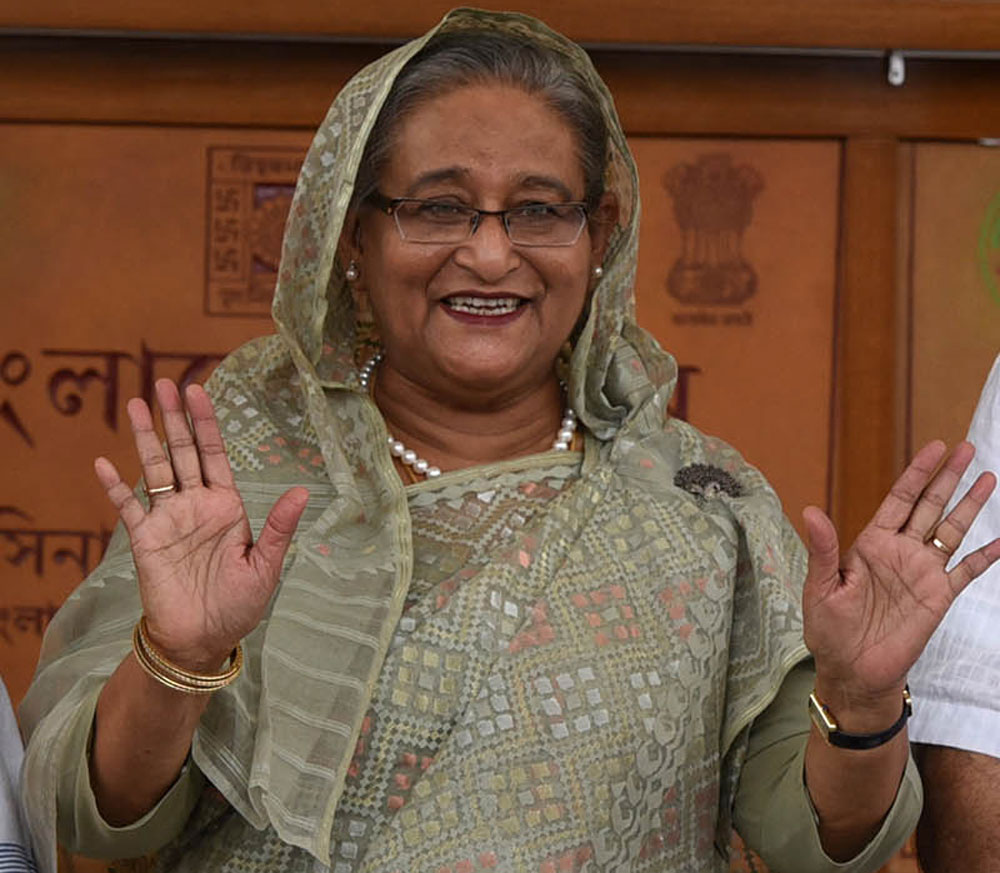Bangladesh Prime Minister Sheikh Hasina on Monday agreed to sit for talks with the Jatiyo Oikyafront (National Unity Front) — an Opposition alliance that included Begum Khaleda Zia’s Bangladesh Nationalist Party (BNP) — about the general election.
The possibility of a dialogue was the outcome of a letter that Kamal Hossain, convenor of the fledgling political platform, sent to Hasina on Sunday.
As part of its seven-point charter of demands, the Opposition alliance has been pressing for the dissolution of parliament, release of Khaleda who is in jail on graft charges and elections with a non-partisan government in power, which the ruling party has consistently rejected.
In protest, the Opposition has been holding rallies across the country from which Hossain had been issuing threats of “unimaginable punishment” to the ruling party.
“The demands and their rejections were leading to a logjam… The Prime Minister’s decision to engage with the Opposition is really interesting. Let’s see what it throws up,” said a source in Dhaka without trying to predict its outcome.
Ahead of the 2014 elections, the BNP’s demand for a caretaker government during the elections was not met, prompting it to withdraw from the poll process. This time as well, the Awami League leadership did not show any signs of giving in to the demand.
Against this background, the two successive moves — Hossain’s letter and the prompt announcement of talks — has sparked intense speculation in Bangladesh.
Awami League general secretary Obaidul Qader made the announcement of talks — without mentioning any date and time — on Monday after the cabinet discussed Hossain’s letter, the form of which was a departure from standard exchanges between ruling and Opposition parties in Bangladesh.
“Though the letter referred to the demands, it was steeped in civility… It was respectful towards the Prime Minister. It mentioned Mujibur Rahman as the father of the nation, a reference that the BNP always shied away from.
“It did mention about a political crisis in the country, but did not hold the ruling party responsible and urged the Prime Minister to find a solution,” remarked a political observer, explaining why the letter stood out because of the way it was written.
Hossain, a renowned jurist, was the law minister in Rahman’s cabinet and had been a senior Awami leader before his fall out with Hasina.
A source in Bangladesh said ignoring the letter seeking talks would have given the Opposition a chance to accuse Hasina of trampling democracy by not engaging with the Opposition, something she could not afford ahead of the general elections since it will be under the international scanner this time.
But with a quick response, she turned it into her advantage and promptly agreed to talks even as her position on the major demands is well known.
“This is great optics, both for local and global audience,” said a source in Dhaka.

Khaleda Zia has been found guilty of misuse of power in collecting $375,000 for the Zia Charitable Trust Fund from unknown sources. Sourced by The Telegraph
The decision will help her politically too, observed the source, as it will send the Opposition parties to the drawing board to work out their next strategy. “Now that she has agreed to talks, the Opposition alliance will have to press a pause button on street protests. But the question is, how long will they wait as no timeline has been offered,” said a political observer.
With the election schedule likely to be announced in the first week of November, futile talks will rob the Opposition of time to prepare for the polls, expected in the third or fourth week of December, the source added.
Some political observers think that another gain for theruling party would be legitimising the leadership of Hossain in the Opposition platform despite BNP’s presence in it. “The Prime Minister’s problem with the BNP is because of its leadership by Khaleda and her son Tareque Zia, who made assassination attempts on Hasina. Though Khaleda has been incapacitated and in jail and her son has been in exile, they held on to the leadership of the BNP, which has been regarded as the main Opposition force. With Hossain at the forefront, the mother-son duo would be relegated to the backseat and she (Hasina) would like it,” explained a source.
There are, however, detractors who consider the BNP as the fulcrum of the Opposition alliance and Hossain just the face of the platform.
While the views are divided over Hossain’s role, there is a near consensus that the convenor of the Opposition alliance will have a tough time defending all the demands if Hasina finally gives him an audience. “As a jurist can he demand Khaleda’s release from the Prime Minister? Can he press for a change in the constitutional provision by pressing for a poll-time caretaker government?” asked an Awami sympathiser.
Then, there is always the possibility of Hasina referring to how an assassination attempt was made on her during the BNP regime and how the party inducted anti-liberation war forces in its fold.
A telephonic conversation between Hasina and Khaleda had drifted to these issues before the 2014 elections, though the duo had worked the phonelines to end the stalemate. “The history of dialogues in Bangladesh is zilch… Hope it will be different this time,” said a source.










